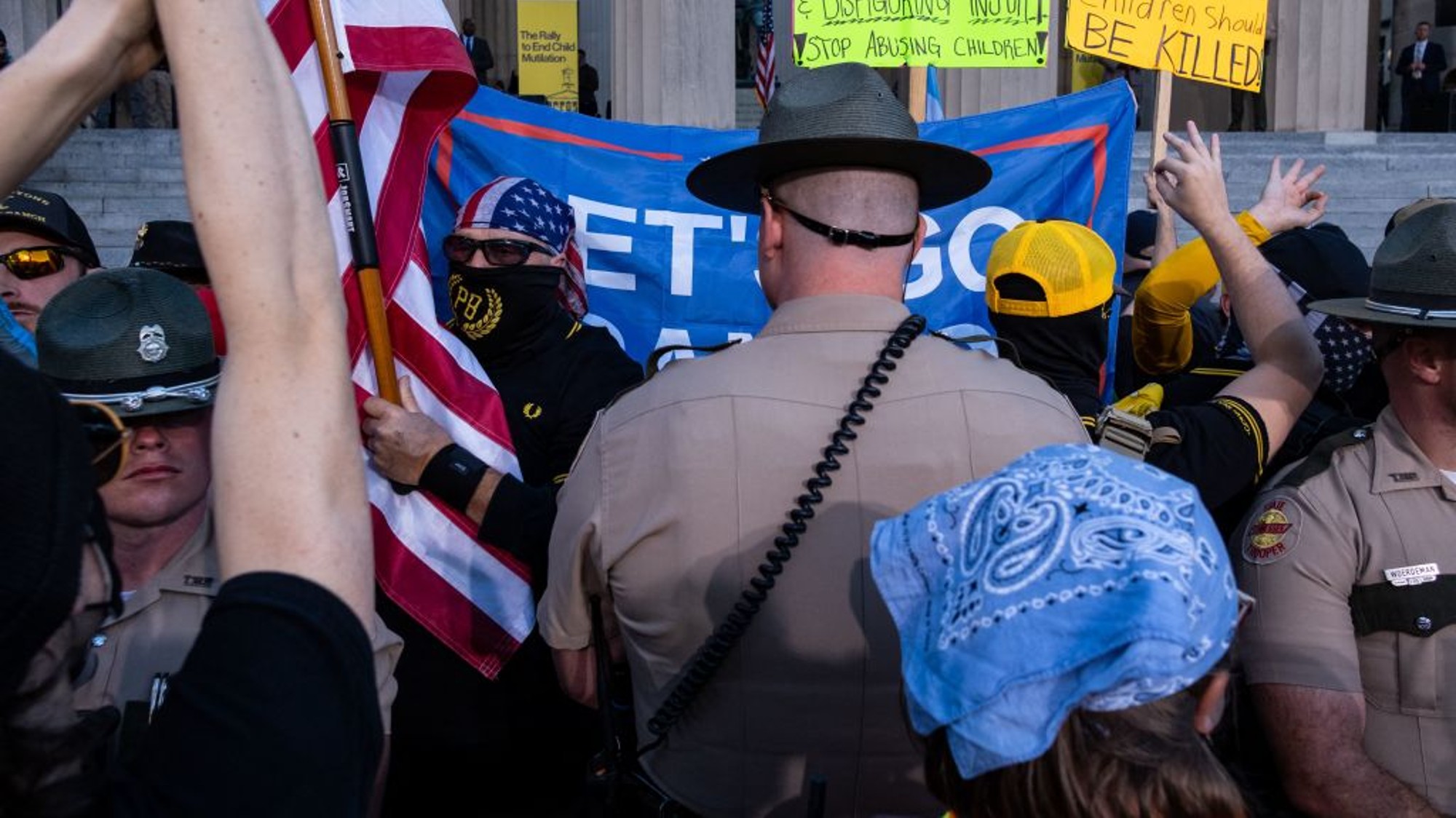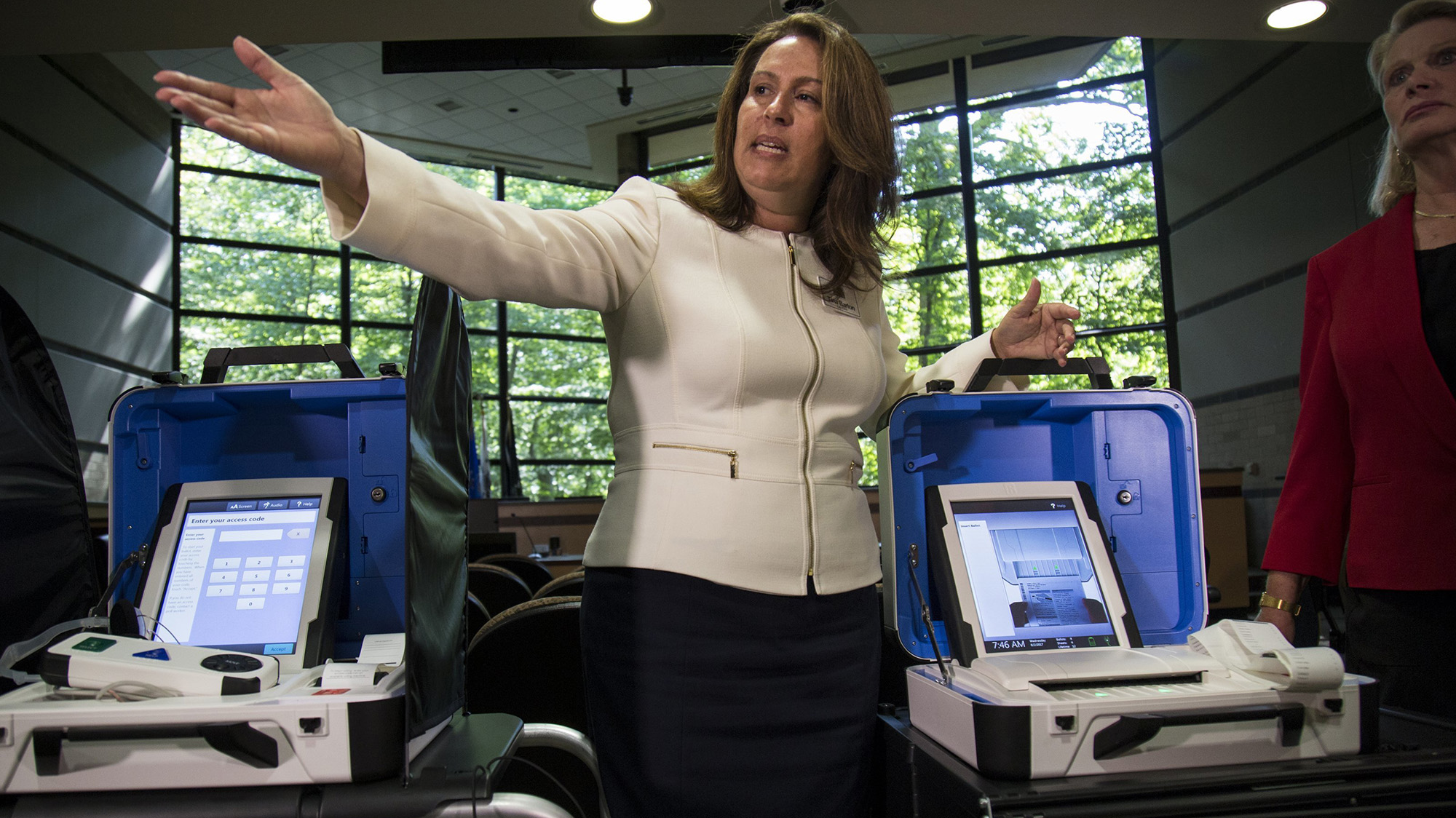
Joe Scott, a West Point graduate with an MBA and a background in finance, ran for Broward County elections supervisor in 2020. At the time, he thought his previous stints as an account manager for a technology company and a facilities administrator at a health care firm would make him a “good fit” for a job that would ostensibly preoccupy him with a mélange of humdrum desk-work.
He was surprised, however, to find how much his military experience in Iraq would come in handy.
With an unhurried demeanor, a lanyard, and a warm smile, Scott comes across more like a beloved social studies teacher moonlighting as a football coach than a soldier. But in the late-2000s, he was an Army captain embedded with the Iraqi military during some of the country’s earliest democratically run elections. In an effort to prepare for hotspots of unrest, the Iraqi leadership of Scott’s battalion pitched going door to door to ask locals how they planned to vote; Scott had to explain to the officer that having uniformed and armed Iraqi military members interrogate locals about their voting plans was “not a good look.”
“It was a different world,” he says of the Middle Eastern country’s shaky, fledgling democracy. “Although,” he adds, “America is kind of moving that way.”
The day after Scott was sworn in as Broward’s elections supervisor, in January 2021, election deniers—incited by Trump’s lies about a stolen election—stormed the US Capitol. He called his wife to ask if she was watching the news. “The Handmaid’s Tale is going down right now,” he recalls telling her. “This is real, right?”
He realized then that in the fleeting moments between the end of his campaign and first week of his new role, the job of “being an election official really changed.”
In the months and years since Trump turbocharged election angst, Scott has had to deal with politically motivated actors spreading misleading information about voting procedures and conspiracy-slinging citizens, some of whom have made physical threats against him and his staff. His experience is not the exception but the norm among the people who have taken up this line of work.
Nearly 40 percent of local election workers have experienced harassment or abuse, according to a recent survey conducted by New York University’s Brennan Center for Justice. Dozens of threats have been so serious as to warrant full FBI investigations, according to the Bipartisan Policy Center, which noted these threats were concentrated in the states Joe Biden narrowly won in 2020. Multiple election officials have even been victims of “swatting,” a dangerous hoax in which a caller reports a fake crime with the intention of triggering a substantial law enforcement response at the home or workplace of their unsuspecting target. These tactics don’t only put election workers at risk, they also intimidate voters. A year after the January 6 attack, the Global Project Against Hate and Extremism asked Americans whether they felt safe at voting locations. Fewer than half said yes.

But if elections are becoming increasingly unhinged, election officials are also making significant efforts to improve their institutions and the public’s trust in them. Clerks and supervisors are fortifying their physical structures with bulletproof glass and GPS-tracked ballot bags and dedicated power supplies and motion detectors. They’re collaborating with law enforcement, and with one another, about how to prepare for and respond to threats in the first presidential race since Donald Trump and his most fervent supporters tried to overturn the 2020 election’s results. This time around, officials like Scott are hoping for a more tranquil transition period. But they’ve also prepared for the worst.
Scott recently showed me around his new election headquarters, which serves as a processing center for vote-by-mail ballots, the recount site for elections that are within half a percentage point, and the place where paper ballots are scanned into Broward’s auditing system. With security guards, a gated parking lot, badge-entry doors classified by clearance level, and windows for inquisitive (or incredulous) civilians to watch over ballot processing, the $103 million building was hardened to withstand both Category 5 hurricanes—and the growing ranks of election conspiracists. Scott notes the building’s design was an exercise in balancing the public’s desire for election transparency with everyone’s need for physical safety. He had managed similar dynamics before.
“Part of my tour in Iraq was preparing for and making sure that those elections went off without any major security things happening,” Scott tells Mother Jones about his service, which earned him a Bronze Star Medal and a Combat Action Badge. “We wanted to make sure people felt safe going to the polling places.”
Nearly 20 years later, that’s exactly what he and fellow US election workers are doing domestically.
Last month, Colorado Secretary of State Jena Griswold was the intended recipient of a package intercepted by a postal center. Its contents included an unknown powder; its return address was labeled “United States Traitor Elimination Army.” The FBI is investigating its origins.
Colorado Secretary of State Jena Griswold was the intended recipient of a package with an unknown powder—its return address was labeled “United States Traitor Elimination Army.”
She said the package was in addition to more than 1,000 threats she received since last September. pic.twitter.com/i7C84mQdEd
— Mother Jones (@MotherJones) October 28, 2024
Griswold, who chairs the Democratic Association of Secretaries of State, said the package was in addition to more than 1,000 threats she has received since last September. One extremist made a threat to her life while she was in the hospital having a C-section; other threats have been sexual in nature. But rather than panic about potential election-related violence, Griswold has channeled her efforts into preventing it.
“We are in this scenario where election officials like myself have to plan for really unnecessary disasters.”
The 40-year-old has worked to reform Colorado’s election landscape, including championing the passage of state election laws, among them one that made it a felony to compromise voting equipment. That was something former Colorado election worker Tina Peters did in 2021 when she allowed an unauthorized person to access data from election machines, images from which were eventually posted on conspiracy-riddled websites. (Peters was recently sentenced to nine years in prison.) Other new regulations Griswold has backed have made it illegal to retaliate against election workers and to have guns near election sites.
Since 2020, Griswold has made available at least $5 million in grant money for more physical security at election sites, which has allowed counties to take measures such as installing bulletproof glass or having Narcan on hand in case fentanyl is deployed as a chemical weapon. “We are in this scenario where election officials like myself have to plan for really unnecessary disasters,” she tells me. “There is no reason we should have to be planning for these domestic conspiracies and the effect it has on our elections, but we have to.”
Election officials elsewhere have been similarly proactive. In St. Charles County, Missouri, the only thing that separated in-person absentee voters from elections staff in 2020 was a row of desks. Kurt Bahr, the county’s Republican director of elections, recently installed a full wall with a locking door and customer service windows to provide a barrier so his employees “feel more secure in case any voter is overly agitated.”
Sante Fe, New Mexico’s clerk has installed GPS tracking devices on all traveling ballot bags. In case someone alleges fake ballots were introduced into the closed system, clerk Katharine Clark can say, “Au contraire. I have this dashboard, and that shows me exactly where my ballot bags are.”
Clark, a Democrat, has also added an accelerometer that measures vibration inside her county’s ballot tabulator to decipher if anyone improperly touched it overnight. Further, her county is issuing personal alert devices for all presiding judges and has hired additional security that will “have eyes and ears on all the public sites.”
One of the remaining challenges election officials face is deciding when a disturbance reaches a threshold that requires the help of law enforcement. “It’s kind of like the definition of pornography,” says Bahr of Missouri. “You know it when you see it.”
Tina Barton has made it her mission to foster coordination between law enforcement and election officials. She learned the importance of this when she became the target of conspiracy-crazed election deniers in the aftermath of the 2020 election.
On Tuesday, November 10, 2020, she walked into her fluorescent-light filled office at Rochester Hills, Michigan City Hall, where she had served as the city’s election clerk for eight years. She saw a blinking light on her desk line. It was a voicemail from an unknown caller.
“Ten million plus patriots will surround you when you least expect it, and your little infantile Deep State security agency has no time to protect you…We’ll fucking kill you,” said the voice, which also threatened bringing a knife to Barton’s throat. “You will fucking pay for your fucking lying-ass remarks…We will fucking take you out. Fuck your family, fuck your life.”
The culprit was eventually identified as Carmel, Indiana’s Andrew Nickels, who has since been sentenced to 14 months in prison; but the victim of the call was effectively hand-selected by the Republican National Committee. After Michigan was called for Biden, then–RNC Chair Ronna McDaniel claimed that fraud had abounded in the state, and case in point were the “2,000 ballots that had been given to Democrats but were Republican ballots,” said McDaniels at a press conference on November 6. “And this took place in Rochester Hills.”
There was a minor issue in Rochester Hills, but it was discovered and corrected well before Nickels left the voicemail. Around 1 a.m. the day after the election, Barton—who had at that point worked more than 18 hours straight—noticed that the county’s website showed a handful of absentee precincts from her county were not showing up. She informed the county, whose officials said they had not received one of Barton’s files. She ran a report and discovered the file was not missing, but saved under the wrong name.
The county advised Barton that the solution was to purge the old file and rerun the absentee precincts, then save that information under the correct file name. But within 24 hours of that step on Wednesday, it was discovered that both files had somehow been added to the county’s total. Immediately, before noon on Thursday, the incorrect file was removed from the system.

Even if the issue was not corrected—it was—Biden won the state by more than 150,000 votes: roughly double the number of people who live in Rochester Hills. An audit led by Republican state legislators would later confirm, in June 2021, that Michigan’s elections were lawfully run, and that temporary mishaps didn’t affect final outcomes. All the while, Barton was perpetually on edge. At the grocery store, she’d think, “Did that person walk too close to me? Why are they everywhere that I’m going?” she tells me. “You become hyper-vigilant about every single thing, and start to view every single thing in person as a possible threat. And that can be really overwhelming.”
While investigators were still working to identify her aggressor, a group called the Committee for Safe and Secure Elections (CSSE) was forming in response to threats against election officials like Barton. It was founded in 2022 by a cross-partisan group of current and former national, state, and local election officials, members of law enforcement, as well as nonprofits across the political spectrum. Barton, a Republican who has since left her election clerk role, is now a vice chair.
Over the last two years, she’s convened nearly 150 CSSE training sessions across more than 35 states, bringing together thousands of election workers, members of law enforcement, facilities managers, hazmat teams, the Cybersecurity and Infrastructure Security Agency, and more to help the various stakeholders preemptively form lines of communication among themselves in preparation for what used to be extraordinary complications: Reports of mysterious substances, menacing phone calls, open-carry demonstrations outside polling sites, accusations of non-citizens voting, bomb threats, and more.
Barton and her co-instructor, former Sheriff for Larimer County, Colorado, Justin Smith, travel to various jurisdictions, pose hypotheticals emergencies such as these, and break the attendees into randomized groups to strategize best practices. “Then we’ll take that opportunity after we’ve heard what they’ve said to see if we have some more things to either challenge them on, or to push their thinking on,” Barton says. CSSE has also made instructional videos and guides for groups and officials who can’t facilitate in-person training.
Election workers, many of whom have already been threatened, are usually eager to accept CSSE’s guidance. But in the beginning, it was sometimes a harder sell to law enforcement personnel, who generally feared engaging in anything political and didn’t realize how rampant election-related intimidation had become. Smith would help convince them by comparing the need for police engagement in election settings with the need for police in school settings.
There were school shootings before Columbine, but the 1999 tragedy was an “awakening period” during which both law enforcement and educators realized they needed to work together to prevent future catastrophes. Similarly, Smith says, “2020 was not the first time we were having problems in elections,” but the scale of chaos from that cycle was a turning point requiring groups like CSSE to help bridge the divides between the various relevant parties.
Barton and Smith’s work is just one part of a growing movement in which individuals are collaborating across professions and party lines to prevent chaos-mongers from affecting people’s constitutional right to vote in 2024. Another nonpartisan organization, the Partnership for Large Election Jurisdictions PLEJ was founded in 2022 to facilitate engagement between election officials who share challenges and, with PLEJ’s help, solutions.
Joe Scott of Broward County is a member of PLEJ, as are 89 more of the largest local election jurisdictions across 33 states. Collectively, the group’s members administer elections for 40 percent of the US electorate. At a September PLEJ panel hosted in Washington, DC, Republican and Democratic election officials from eight states came together to talk about their security plans and structures. Carolina Lopez, the executive director of PLEJ and a member of CSSE, says that the officials often invite each other to their sites to trade tips. “Instead of every little fiefdom building something, we’re putting all of our resources together,” says Lopez.
The fraternization may never have happened so quickly—or at all—if Trump hadn’t repeatedly claimed the 2020 election was stolen from him, provoking people like Andrew Nickels to assail local bureaucrats like Tina Barton. CSSE and PLEJ didn’t exist then, and they do now.
Unfortunately, so do new threats. “I’m actually really hopeful as we go into the 2024 general election,” says Barton. “I’m also cautious.”















